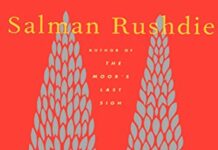
Ebook Info
- Published: 2011
- Number of pages: 578 pages
- Format: EPUB
- File Size: 1.03 MB
- Authors: Salman Rushdie
Description
#1 NEW YORK TIMES BESTSELLER • “[A] torrent of endlessly inventive prose, by turns comic and enraged, embracing life in all its contradictions. In this spectacular novel, verbal pyrotechnics barely outshine its psychological truths.”—NewsdayWinner of the Whitbread PrizeOne of the most controversial and acclaimed novels ever written, The Satanic Verses is Salman Rushdie’s best-known and most galvanizing book. Set in a modern world filled with both mayhem and miracles, the story begins with a bang: the terrorist bombing of a London-bound jet in midflight. Two Indian actors of opposing sensibilities fall to earth, transformed into living symbols of what is angelic and evil. This is just the initial act in a magnificent odyssey that seamlessly merges the actual with the imagined. A book whose importance is eclipsed only by its quality, The Satanic Verses is a key work of our times.Praise for The Satanic Verses“Rushdie is a storyteller of prodigious powers, able to conjure up whole geographies, causalities, climates, creatures, customs, out of thin air.”—The New York Times Book Review“Exhilarating, populous, loquacious, sometimes hilarious, extraordinary . . . a roller-coaster ride over a vast landscape of the imagination.”—The Guardian (London)“A novel of metamorphoses, hauntings, memories, hallucinations, revelations, advertising jingles, and jokes. Rushdie has the power of description, and we succumb.”—The Times (London)
User’s Reviews
Reviews from Amazon users which were colected at the time this book was published on the website:
⭐Nothing to do with the book contents but Amazon has incorrect publisher and date listing here.”Publisher : The Consortium, Inc. (January 1, 1992) ” Great! That is the first paperback printed and the Consortium was formed by Rushie and two others with anonymous help in the US because Vintage in the UK would not publish it after the fatwa. So it finally came out 3.5 years after the hardcover! I ordered off this page at Amazon because it lists the 1992 Consortium edition. BUT it is the johnny-come-lately 1998 Vintage UK edition. False advertising, so I will return it for refund. I tried to fill in the incorrect info form here, but was rejected for including “personal information”, which was not the case either. So if you want a PB copy of the Verses, fine; but if you want what is listed here as the Consortium printing from 1992, you will be unhappy.
⭐I finally got around to The Satanic Verses. You just have to read a book which got a death sentence for the author. Really, after the Ayatollah Khomeini issued the fatwa calling for Salmon Rushdie’s death, Rushdie’s Japanese translator was killed, his Italian translator and his Norwegian publisher were both stabbed (didn’t die) and his Turkish translator ducked, but the miscreants burned down his hotel and killed 37 non-fatwa folks. So I sort of had to see what it was all about. I assumed it was culturally rich and I attended two lecture series on Islam to help me catch at least some of the obscurities. I’m sure I missed a bunch, though. It is culturally rich, alright, but more in Indian culture than Islamic and I did not attend any Indian lectures.There are two major characters in the book: Gibreel Farishta and Saladin Chamcha. Both are more or less self made guys who have each attained some success in entertainment fields. Gibreel in movies, a regular heartthrob, and Saladin in voiceover work where his speciality is upper class English diction. Saladin hates being Indian and has decided that his heart belongs to England and to his ultimately and callously unfaithful wife, wait for it, Pamela (is that English or what?). The two (Saladin and Gibreel) find themselves on a flight from India to England which is first hijacked and then blown up at cruising altitude where the two, during the long trip to Earth, have a discussion which is interrupted by, of all things, their survival from the fall (it is instructive to note that during the plummet, Saladin chooses to use up some of his apparently limited time by singing Rule Britannia). Things change, one might say.Fourteen or so centuries earlier we are introduced to Mahound (I am given to understand that referring to The Prophet Muhammed in that fashion is disrespectful) who is in the process of attempting to convert the polytheistic Arabs of Jahilia. What? I thought it was Mecca. Well, it’s deep, see? Jahilia is apparently an Arabic term meaning “ignorance of the will of God”, which describes the pre conversion state of the Meccans, I assume. Things are not going well. Muhammed is in the process of receiving the Holy Quran from God through the angel Gabriel (Arabic “Gibreel”. See where this is going?), while at the same time preaching monotheism with only limited success. Temptation arises when the head Sultan (or something) asks Muhammed to just spare a few, only three, of the three hundred sixty gods to please the ruler’s wife whose family is in charge of the temples of the three female gods and gets money during the pilgrimages. Muhammed goes to the mountain cave, enters his trance and comes back down the hill and permits the three female gods to be honored. There is a hoo-hah among the followers of Muhammed because they have bought into monotheism and are disappointed. Muhammed goes back up the mountain, into the cave, back down the mountain into Jahilia and announces that the verses allowing the three gods were from Satan, not God, and withdraws them. Get it? The Satanic Verses. They’re the real deal, actually existing in some ancient Islamic texts, but fervently denied currently.That’s it. That’s the story which got people stabbed and burned up. Muhammed was misled by Satan, caught on, rectified the mistake and continued to receive valid revelation from God through Gabriel so that ultimately the Quran was the direct and pure word of God. I don’t get it. Seems to me like the God who created the entire Cosmos would have enough horsepower to deal with an errant author on His own. It even seems to me that it wasn’t all that nasty in the first place – most Muslims assiduously avoid deification of Muhammed. I think they are just grouchy. I oversimplify somewhat. It can be said that the general tone of the episodes concerning the revelations to the Prophet can fairly be said to call into question whether maybe some of the revelations were Muhammed dealing with ad hoc situations in his personal life. Was there a disagreement with his favorite wife? Up comes a revelation setting her straight on the issue. So some Muslims got angry with Salmon.Here I must digress and impose a hiatus while I read Nikos Kazantzakis, The Last Temptation of Christ, a book which had a similar effect in the Christian community, although I do not think anyone was stabbed or burned. Also, not atypically, the reaction was not to the book, which is sort of fat and not likely to be read by our Christian lot, but rather to the movie made from the book. I shall choose the book as the basis for my comparison knowing full well that I am opting for twelve hours or so as opposed to two, a significant sacrifice to the blogger’s muse.I will get back to this when I complete Last Temptation and can think more clearly about the rather common, but to me inexplicable, violent response to perceived blasphemy.Okay, now I am better informed. The Last Temptation of Christ is a book from the 1950’s and is afflicted with theology even older than that. I suspect that Kazantzakis wrote it as a sort of Midrash, a riff on Jesus’ humanity, which seems a legitimate and loyal-Christian kind of thing to do. There are distractions, of course, which seize the attention (Mary Magdalene is nowhere in the Bible described as a whore), but all in all the attempt is nicely done to make the point, which seems to be that Jesus is an example of how the most attractive and intense temptations of life can be overcome. The point is made with rather extreme examples: Jesus waiting in line at a whorehouse, Jesus sucking up to Romans by making crosses for their executions, Jesus trying to make God hate Jesus so that the load of Messiah-ship may be taken off, but it all comes out alright in the end, good triumphs, evil is defeated. So what’s wrong with that? What on Earth about the book prompted such vituperative rants from offended believers?It’s fundamentalism, that’s what it is. Not exactly a spoiler. Those who struggle with a subconsciously held worry that their beliefs are fragile, puny, ephemeral and subject to destruction by countervailing views will always react with violence to any description of their orthodoxy which strays from the company line. And so it is with Satanic Verses. The true believer must leap to the defense of God, who by reason of frailty one supposes, is insufficiently strong to handle the defense himself. Apparently God exhausts himself with the first iteration of the revelation and must rely on believers to keep the revelation pure and unsullied by those who would vary the storyline. It’s sort of silly, although the silliness is somewhat blunted by the firebombs and terrorism with which believers often make their point.The Satanic Verses is beautifully written, funny and marvelously inventive. Saladin, for instance, does not quite get the angelic treatment of Gibreel in that Saladin morphs into a faun, Pan, some sort of goat-legged horned-head Priapic sulfur stinking denizen of Hell with the personality of a complete sissy. It is a delightful read, and I wholeheartedly recommend it – just don’t read it looking for some hardcore blasphemy. Beats me if it’s in there anywhere.
⭐Great book. Dense but a great read. Nice to support the author after being attacked!. Wishing him the best.
⭐It looks dotty and a bit blurry. Honestly looks better through iPhone pictures than in person. Still readable and in fine condition.
⭐Not an easy read but well worth the tribute to S R
⭐I’ve waited a good two weeks after finishing this book to write this review. I wanted to let my mental dust settle. Now I feel obliged to my fellow readers and to my own academic pursuits to have at it. First, I must say that this is one of the few books I’ve read since my retirement nine years ago that was really WORK to read. Nevertheless, I was compelled to buy it, because of its historical importance: I needed to see what it was that caused its author to receive a condemnation to death by a very highly placed religious source. They put a price put on his head — a bounty — to encourage his murder. The author suffered years of agonizing grief hiding from the madmen searching him out. Fortunately, in the best interests of civilization, they haven’t found him — yet.As for the literature, indeed the author is brilliant — an artist with the language, sometimes a poet. But the author, while brilliant with his craft, is NOT a good story teller. The story rambles painfully. I found my own agony just trying to follow it. The genre is called “magical realism,” if I recall correctly. After finishing the book, I had to call it up on Wikipedia to learn that it’s actually three stories in one. Yes, I knew going in that it was offensive to Islam, thus the fatwa. Nevertheless, I hung in, trying to stay up with the different characters, some of whom have three different names.Had I not some background with Islamic studies, I would have been left behind on page five. I’ve lived in Saudi Arabia for almost a year in the mid seventies, I’ve read the Quran, the hadith and a biography of Muhammad. Even with that background, I was BARELY able to recognize the satire. I say EMPHATICALLY, unless you FIRST read at least a biography of Muhammad, DO NOT read this book!! Then, tape your ankles!!Finally, apart from recognizing the author’s genius, I’ll assess the real value of this novel at the bottom line: Together with the outrageous reaction to it and the advocation of a heinous crime by those offended, we are helped in our understanding of the utterly low level of civilization among a large part of our population today. Is there hope for them in the 21st century? You tell me.
⭐I finally got around to reading this decades after it came out. The recent attack on Rushdie sparked my interest in it, coupled with the fact I’m an avid daily reader now, where I wasn’t when it originally came out. I will probably have to re-read it at some point as I had trouble understanding/following the storyline. It seems that artistically it’s well written, but as someone mentioned in another review, it’s not the classic page-turner that a lot of us like. It was a heavy-going read that took some effort to get through. It’s definitely a “bucket list” kind of book to read, but it won’t be very high up on my favorites list.
⭐Some 30 years after its publication, I picked up this book (second hand) to see what all of the fuss had been about in the pre-ISIS days of the Ayatollah Khomeini who had replaced the Sha of Iran (Persia).Before reading this huge rambling (but often amusing) 540+ pages; a difficult book. Do read the Wikipedia page on the Rushdie Fatwa resulting from this book and explanations of its origins. There was, as of 2016, still severe controversy relating to the author and the Muslim allusions in (and interpretations of) his story. It will also help to have an understanding of Indian cultural (and food) terms, the culture in Mumbai in the 1980’s and some of the historical friction between Christians and Muslims. The book is still banned in many countries with a significant Muslim population.To the average Western reader this may be seen as a simple (?) comical tale of the amazing survival of two Indian actors, blown out of the skies by a fanatical suicide bomber, then their experiences and escapades in England, supplemented by flashbacks to their historical development in India and subsequent interaction of Asians with UK culture at the time of the Thatcherite years (significant institutional racism and even racial violence).One survivor takes on the attributes of the angel Gabriel, the other the devil Saladin and we follow their escapades, lives and loves and their reversion to more human form. The story is constantly interwoven with actual and imagined historical events.Is it religiously offensive? Possibly to those of a strict Muslim upbringing and their religious leaders interpreting what is said alongside the Quran. I am sure than many decried the book without ever reading it – as happened with many other books/ films which attracted notoriety.Compared to the non-event Christian fuss over Monty Python’s “The Life of Brian”, there is a certain fantasy section relating to certain reported history of the prophet which could certainly be interpreted negatively by those of a strongly Muslim religious view (You need to read beyond 300+ pages to come to this section) – see also the Wikipedia review mentioned above.Is it worth reading? If the above does not put you off but intrigues you get hold of a library copy and see!
⭐I really have no idea what all the fuss was about. I initially bought a copy on the street whilst stuck in a traffic jam in London. The vendor was handing them out as if he was Kim Philby. As for the mentioning of the Prophet, and considering that people were killed during demonstrations, it never ceases to amaze me that people can take offence at the merest hint. As Christopher Hitchens said, most of the demonstrators had never read the book, even if they could actually read. We live in sad times.
⭐A very strange piece of fiction, jumping around in a way that was frequently painstaking to keep up with. The style reminds me slightly of another quirky author whom I enjoy greatly, but Salman Rushdie doesn’t get it right for my taste. I couldn’t decide if some of the ‘odd’ elements (such as joinedupwords) were intentional, or a mistake in the conversion to Kindle. These quirks were, to me, an irritation. I felt as well that the book was far too long and had no meaningful conclusion – no pay-off for all my work getting through it.The subject matter is of passing interest to me, and the controversy surrounding the book is intriguing. The story is entirely fictional, and intended as a comedy (not at all funny, in my opinion). However, there are parts of this fiction that makes observations about Islam, which I can understand Muslims would find hard to ignore. Ultimately though, it is really only a “what if” that can surely be overcome by faith, just as the Christian faith in Jesus was not shaken by that other comedy, “The Life of Brian”.
⭐Freedom of Speech matters
Keywords
Free Download The Satanic Verses: A Novel in EPUB format
The Satanic Verses: A Novel EPUB Free Download
Download The Satanic Verses: A Novel 2011 EPUB Free
The Satanic Verses: A Novel 2011 EPUB Free Download
Download The Satanic Verses: A Novel EPUB
Free Download Ebook The Satanic Verses: A Novel





